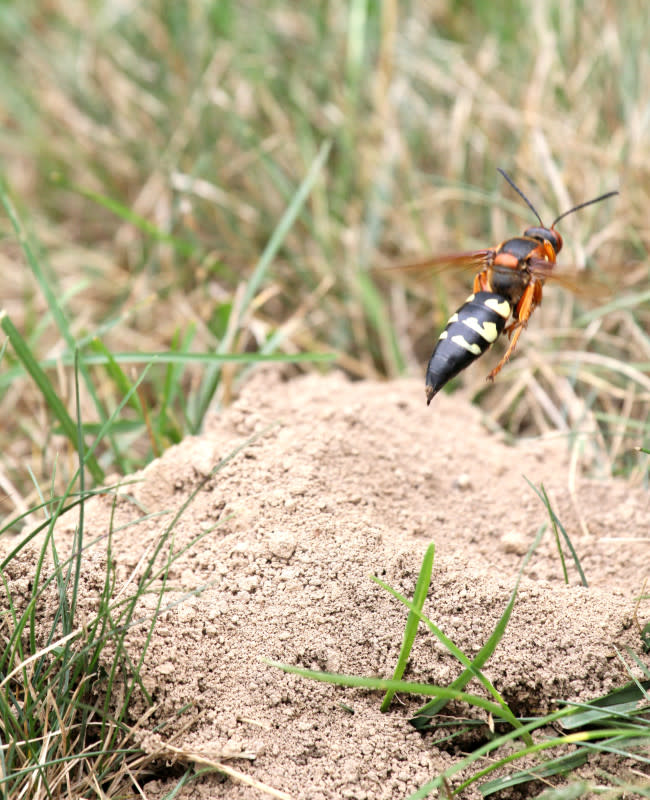'Double' the Amount of Cicadas Are Coming This Spring in Once-in-200-Year-Event—And These 2 States Will Be Hit the Hardest

Dog-day cicada (Neotibicen canicularis) on a wooden fence
Get ready for a noisy summer: Double the normal amount of cicadas are predicted to emerge this year.
Melodramatically dubbed by some as a "cicada apocalypse," there is a reason why we're going to see so many of them in 2024. Find out everything to know about why there will be so many cicadas in 2024 (AKA a double-brood!), how many cicadas to expect and which states they'll hit the hardest.
Related: The Surprising Ingredient That Can Repel Mosquitos
Why are there so many cicadas in 2024?
It's all about the timing.
"Some cicadas are annual, but some are considered 'periodical,' in that they manage to have synchronized life cycles that result in emergence at extended time intervals," University of Las Vegas professor Chad L. Cross tells Parade. "In the U.S., two important groups of periodical cicadas emerge either every 13 or 17 years. Given this periodicity, this offset timing coincides in some cases such that broods (i.e., the young cicadas) of both 13- and 17-year cicadas emerge simultaneously."
How many cicadas will there be in 2024?
According to Prof. Cross, this results in what's called a "double-brood event," and that means a lot of cicadas. How many? Brace yourself: There will be more cicadas than there are dollars in Jeff Bezos' net worth.
"Some estimates are that more than a trillion cicadas could emerge this year," Prof. Cross says.
Related: Dealing With Moths in Your House? Here’s Exactly How To Get Rid of Them
What states will have the most cicadas in 2024?
Basically, states that start with "I" will be impacted most.
Entomologist Molly Keck of Texas A&M University says that parts of Iowa and Illinois will be hit the hardest, as that's where there's the most overlap between the 13- and 17-year cicada broods.
"There may be some in western Indiana, but east from there I wouldn't expect any of these cicadas," entomologist and University of Las Vegas Prof. Allen Gibbs tells Parade. "Periodical cicadas are only found in the eastern U.S., so most of the country will just see their usual annual cicadas."
When will cicadas emerge in 2024?
Depending on where you live, you may see cicadas earlier or later this year. Brood XIX, also called "The Great Southern Brood," is expected to emerge in late April to early May in Alabama, Arkansas, Georgia, Illinois, Indiana, Kentucky, Louisiana, Mississippi, Missouri, North Carolina, Oklahoma, South Carolina, Tennessee and Virginia, Shannon Harlow-Ellis, associate certified entomologist and technical services manager at Mosquito Joe tells us.
Harlow-Ellis says that Brood XIII, also called the Northern Illinois Brood, is likely to emerge between mid-May and early June in Illinois, Indiana, Iowa, Wisconsin and parts of Michigan.
Are cicadas harmful to humans?
You mean, apart from being loud and annoying? Nope! They don't bite and are harmless to humans, homes, gardens, pets and livestock. That said, when we say they can get loud, we mean it: Prof. Cross says that male cicadas' courting sounds can reach over 90 decibels in certain species—that's equivalent to a lawn mower!
Related: Bugs, Be Gone! These Are the Best Ways To Get Rid of Gnats Permanently
Are large cicada broods bad for the ecosystem?
While the sight and sound of so many cicadas may irk people, it's actually beneficial for the ecosystem when these big bugs come out to play.
"Cicadas provide an enormous energy boost to the food web by serving as food for many animals. Wasps and spiders and robber flies, for example utilize them," Prof. Cross explains. "Birds and mammals eat them, and even aquatic animals like amphibians and fish will eat them if they fall into the water."

chiptape/Getty Images
If you live in the areas of brood overlap and see some small holes burrowed in your lawn, you may want to leave them be: Those may be from wasps called cicada killers, which feed on cicadas. (And similar to cicadas, they're largely harmless to humans, but they're huge, loud and scary-looking!)
"Some wasps, called 'cicada killers,' hunt for cicadas, sting and paralyze them, drag them back to their burrows and lay an egg on them," Prof. Cross explains. "The developing larvae will feed on the paralyzed cicada as it develops."
Why do cicadas only come out periodically?
If you're wondering why some springs and summers are quieter than others in regard to cicada populations, it's an evolutionary tactic that basically amounts to strength in numbers.
"The idea behind these infrequent simultaneous emergences is that billions of cicadas all at once will overwhelm predator populations," Prof. Gibbs says. "Most individuals will get eaten, but the lucky few will produce offspring."
When will the next cicada apocalypse be?
Prof. Gibbs says to mark your calendars for 2089. "Brood XIX will be back, and a large 17-year eastern brood, Brood X, will also emerge."
After that? Rest easy: We'll be done with these until 2245.
Next, How to Get Rid of Bed Bugs, According to a Pest Control Expert
Sources
Chad L. Cross, University of Las Vegas professor
Professor Allen Gibbs, entomologist, University of Las Vegas
Shannon Harlow-Ellis, associate certified entomologist and technical services manager at Mosquito Joe
Molly Keck, entomologist, Texas A&M University
